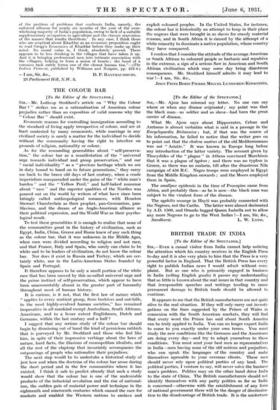THE COLOUR BAR
[To the Editor of the SPECTATOR.] SIR,—Mr. Lothrop Stoddard's article on " Why the Colour Bar ? " strikes me as a rationalization of American colour prejudice rather than an exposition of valid reasons why the " Colour Bar " should exist.
Economic reasons for controlling immigration according to the standard of living apply irrespective of colour, and are at least contested by many economists, while marriage in any civilized society is surely a matter for the individual to decide without the community having the right to interfere on grounds of religion, nationality or colour.
As for the resounding generalities about " self-preserva- tion," the colour bar as a manifestation of the " universal urge towards individual and group preservation," and our " racial individuality " as a " precious heritage which we are in duty bound to hand on to future generations," they carry me back to the brave old days of last century, when a crude imperialism masqueraded under the guise of the " white man's burden " and the " Yellow Peril," and half-baked nonsense about " race and the superior qualities of the Nordics was poured out on the world by writers of what have since been bitingly called anthropological romances, with Houston Stewart Chamberlain as their prophet, pan-Germanism, pan- Slavism, and the dream of an Anglo-American alliance as their political expression, and the World War as their psycho- logical result.
To test these generalities it is enough to realize that none of the communities great in the history of civilization, such as Egypt, India, China, Greece and Rome knew of any such thing as the colour bar, that it was unknown in the Middle Ages, when men were divided according to religion and not race, and that France, Italy and Spain, who surely can claim to be white and to be leaders of civilization, do not know the colour bar. Nor does it exist in Russia and Turkey, which are cer- tainly white, nor in the Latin-American States founded by Spain and Portugal.
It therefore appears to be only a small portion of the white race that has been moved by this so-called universal urge and the prime instinct of self-preservation, which appear to have been unaccountably absent in the greater part of humanity throughout most of human history.
It is curious, is it not, that the first law of nature which " applies to every sentient group, from beehives and ant-hills, to the most highly-evolved human societies," has remained inoperative in all mankind except Australians, South Africans, Americans, and to a lesser extent Englishmen,. Dutch and Germans, within the last century and a half ?
I suggest that any serious study of the colour bar should begin by dismissing out of hand the kind of pernicious rubbish that is purveyed by Mr. Stoddard and those who feel like him, in spite of their impressive verbiage about the laws of nature, hard facts, the illusions of cosmopolitan idealists, and all the rest of the claptrap that invariably accompanies the outpourings of people who rationalize their prejudices.
The next step would be to undertake a historical study of just how and when the doctrine of the colour bar arose during the short period and in the few communities where it has existed. I think it safe to predict already that such- a study would show that the colour bar is one of the undesirable products of the industrial revolution and the rise of national- ism, the sudden gain of material power and technique in the eighteenth and nineteenth centuries which caused the race for markets and enabled the Western nations to enslave and
exploit coloured peoples. In the United States, for instance, the colour bar is historically an attempt to keep in their place the negroes that were brought in as slaves for crassly material reasons, and in South Africa it is Caused by the attempt of a white minority to dominatea native population, whose country they have conquered.
I confess that I consider the attitude of the average American or South African to coloured people as barbaric and repuliive in the extreme, a sign of a serious flaw in American and South African civilization which may some day bring disastrous consequences. Mr. Stoddard himself admits it may lead to war !—I am, Sir, &c.,
JOHN FRITZ BORIS PIERRE MIGUEL LUNDGRF-N-KOSICIMIES..






































 Previous page
Previous page